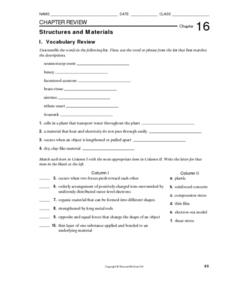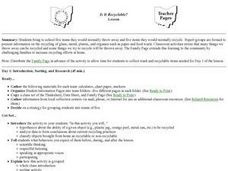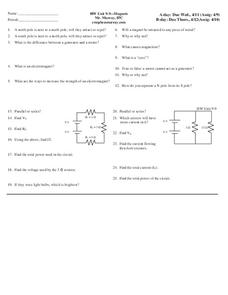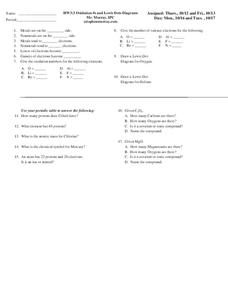Curated OER
Metal Quiz
In this metal learning exercise, students answer short answer questions and true and false questions about different metals found on Earth. Students complete 10 questions.
Curated OER
All About Aluminum
Students examine the metal aluminum. In this metal properties lesson, students experiment to distinguish between aluminum and other metals. Students assess how aluminum is created and recycled.
Curated OER
What's Inside the Earth?
In this earth's composition worksheet, students read about the layers within the earth and they answer 3 multiple choice questions. They color a diagram of the earth's core using different colors to represent the solid metal, the liquid...
Curated OER
Magnesium: From Sea Water to Fireworks
In this magnesium worksheet, students read about how magnesium is extracted from sea water and the different uses of magnesium. Then students complete 4 short answer questions.
Curated OER
Structures and Materials
In this materials learning exercise, students will review different types of materials and the structures that can be made using these materials. This learning exercise has 7 fill in the blank, 6 matching, 1 short answer, and 6 multiple...
Curated OER
Transition Elements
For this transition elements worksheet, high schoolers complete 10 fill in the blank statements about the properties of transition elements. Then students will match 10 elements with the use of that particular element.
Curated OER
Chemistry Scavenger Hunt
In this chemistry worksheet, students identify the three main phases of matter. Then they search for information about each element on a Chem Time Clock. Students use the chemical symbol to identify each element.
Curated OER
Chemistry Activity 29
In this chemistry worksheet, students write the balanced chemical equation for each. Then they calculate the mass of nitrogen dioxide created with specific amounts of nitrogen and oxygen. Students also identify how many grams of the...
Curated OER
Metals, Non-metals, Metalloids
Students discuss the physical and chemical properties of metals and non-metals. As a group, they classify items as a metal or non-metal. Using the periodic table chart, students discuss the characteristics of each metal. Based upon...
Curated OER
Is It Recyclable?
Students bring to school five items they would normally throw away and five items they would normally recycle. Expert groups are formed to present information on the recycling of glass, metal, plastic, and organics such as paper and...
Curated OER
Magnets
In this magnets worksheet, students describe the differences between a generator and a motor, define electromagnet, and identify a circuit as parallel or series. This worksheet has 2 short answer questions, 5 fill in the blank and 18...
Curated OER
Oxidation Numbers
In this oxidation numbers activity, students determine the oxidation number for given elements and draw Lewis Dot Diagrams. This activity has 6 fill in the blank and 11 short answer questions.
Curated OER
What is a Solution?
In this solutions worksheet, students read about how people first learned to use metals and to combine metals to form alloys. Students write an essay telling the story of how ancient people first learned to cause physical changes in metal.
Curated OER
What Does a Magnet Attract?
In this magnet worksheet, students write in what happens when a magnet is placed near iron. This worksheet is a graphic organizer.
Curated OER
Amazing Magnets Crossword Puzzle
In this physics worksheet, students identify and write the correct word for each description related to magnets. There are 12 descriptions to complete.
Curated OER
Organization of the Elements and Periodic Table
Students identify how to relate the position of an element in the periodic table to its atomic number and atomic mass. They also identify and interpret how to use the periodic table to identify metals, semimetals, nonmetals, and...
Curated OER
What a Can Can Do
Students explore properties of cans (including aluminum and steel) as they rotate through stations. They experiment with magnets, weight differences, resistance to corrosion and temperature conductivity.
Centers for Disease Control and Prevention
Centers for Disease Control: Atsdr: Toxicological Profile for Plutonium
This article is designed to inform people of the health risks associated with plutonium. It explains how a person might be exposed to the element, and what the effects might be.
Cornell University
Cornell University: Art, Design, and Visual Thinking
Use the left-hand toolbar of this site to investigate an online textbook for the language of design. It provides visual examples and explanations of line, form, color, color psychology, texture, balance, proportion and many more...
Science Buddies
Science Buddies: Which Metal Is the Most Resistant to Corrosion?
Here's a practical engineering challenge: you need to build an enclosure for your dogs, using material that they can't chew through. It's going to be a lot of work to build, so you want to do it right. What material should you choose for...
Environmental Chemistry
Evironmental chemistry.com: Periodic Table Aluminum
A great site with a wealth of information on aluminum. Exceptionally thorough and helpful.
Museum Network (UK)
Wallace Collection: Material World: Metal
Learn about the artistic use of metals as a medium for creating art and decorative objects.
Other
Steel Tube Institute of North America
Information about this group that joined together to help improve the steel tube industry. You can find out who are members of this group, the history, the structure of this industry, the products they produce, general information, and...
Texas Education Agency
Texas Gateway: Chemical Bonding: Metallic Bonds
Given scenarios or diagrams, students will describe the nature of metallic bonding and explain properties such as thermal and electrical conductivity, malleability, and ductility of metals.
























